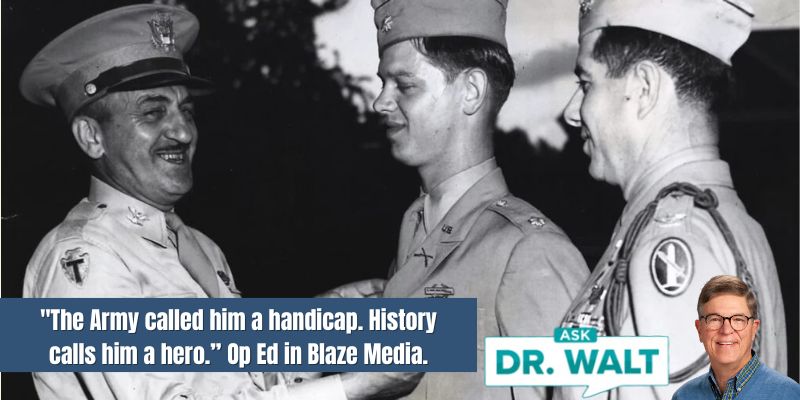
March 18, 1944 – To seize a beachhead like Anzio was one thing—to hold it indefinitely was another
March 18, 2024
A recording of my WWII presentation at the LSU Military Museum
March 20, 2024

Tucker added:[1]
To appreciate Anzio it is necessary to remember that the beachhead is shaped like a fan, the handle of which is a sort of funnel. The Germans are spread out all around the fan and their idea of fun is to see how many shelves they can pour through the funnel.
Naturally there are a lot of buildings at the end of the funnel and when you pour artillery fire into a bunch of buildings some of them are going to be hit.
Right now the big argument on the beaches whether those shells have a booster charge that explodes while they’re still on their way, or whether it’s a vacuum that gives off that scratching noise as they pass over your head. The subject is very controversial, and old friends have become bitter over the point.
I wouldn’t pretend to know which it is, but I do know they always wait until they’re right over your head before they do whatever it is they do.
During dinner the other night some captain from Boston told Ernie Pyle he knew it was vacuum.
“Well,” said Pyle, “it’s the first time I ever saw a vacuum throw shrapnel.”
We eat well on the beachhead. Some of the mess sergeants come up with the most unpredictable menus. The other day I was out with the tank destroyer outfit commanded by Maj. Edward L. Austin, son of Senator Warren Austin of Burlington, Vt.
Austin looked at me and said, “You like meat? I mean meat that’s fresh?” When I nodded, he went on.
“It’s a funny thing. There are cows on this beachhead. Sometimes they get killed. In spite of anything you can do some cows just won’t keep out of the way of bullets.”
With light hearts we strolled over to a mess kept hidden in a grain field and ate all the fresh meat we could hold.
The front lines on the beach are pretty close together, so close the men on both sides can talk to each other. But they don’t dare lift their heads above ground level. One of our boys wasn’t feeling so good and asked an Army doctor to look at his throat.
“I think I’ve got diphtheria,” the boy said.
“No, son,” the doctor said, peering into the throat. “You haven’t got diphtheria.”
A German across the way yelled, “The hell he hasn’t.” That’s how close the lines are.
Every square inch of the beachhead is in range of enemy fire and the Germans can bring artillery to bear on any given point at any given moment of the day or night, and they generally do. They toss shells in continually and they kill men every time they do.
Perhaps this imminence of danger has something to do with it, but it seems to me that nowhere in the war have I known men who were more genuine or more sincere. There are no small squabbles or pettiness on the beach. The guys are all pulling for each other. You never hear a military policeman bawl out anybody for being incorrectly dressed as they do in back areas. You never hear of anybody getting into fist fights. They might run into shell burst.
One minute an amphibious duck flounders out of the harbor and rolls down past to some secret duck-haven where supplies are unloaded. The next moment Belgian Spitfire alights on the little park-like runway near the sea, where emergency repairs are made on momentarily distressed planes. Always these incidents are punctuated by the crack of German cannon fire.
The men who make these repairs have dug themselves a subterranean city and spring out of their holes when the planes come in, readying them for immediate flight. Most of the time they get away with it.
There is a church at Anzio known as the church of Saint Teresa. The Italian say the hand of God is on it. No shell or bomb fragment has ever touched it. The other night three enlisted men were caught in a raid and try to get to it for shelter. They were picked up in the street almost in the shadow of the church, and there were shell marks all over that vicinity, but St. Theresa still stands.
Out in the lines the men say anybody who lives in Anzio is crazy. They much prefer the forward area us to city life. The town is under fire day and night. One day they got the officers’ mess. The next they got Villa Virtue, where the correspondents live. You never know from one shell to the next, but then it wouldn’t be Anzio if you did.
[1] George Tucker. Associated Press Staff Writer. Naples. News Clipping in small brown scrapbook with heavily embossed front.
In case you haven’t read or listened to Dad’s book, you can learn more or order it here.
© Copyright WLL, INC. 2024.




